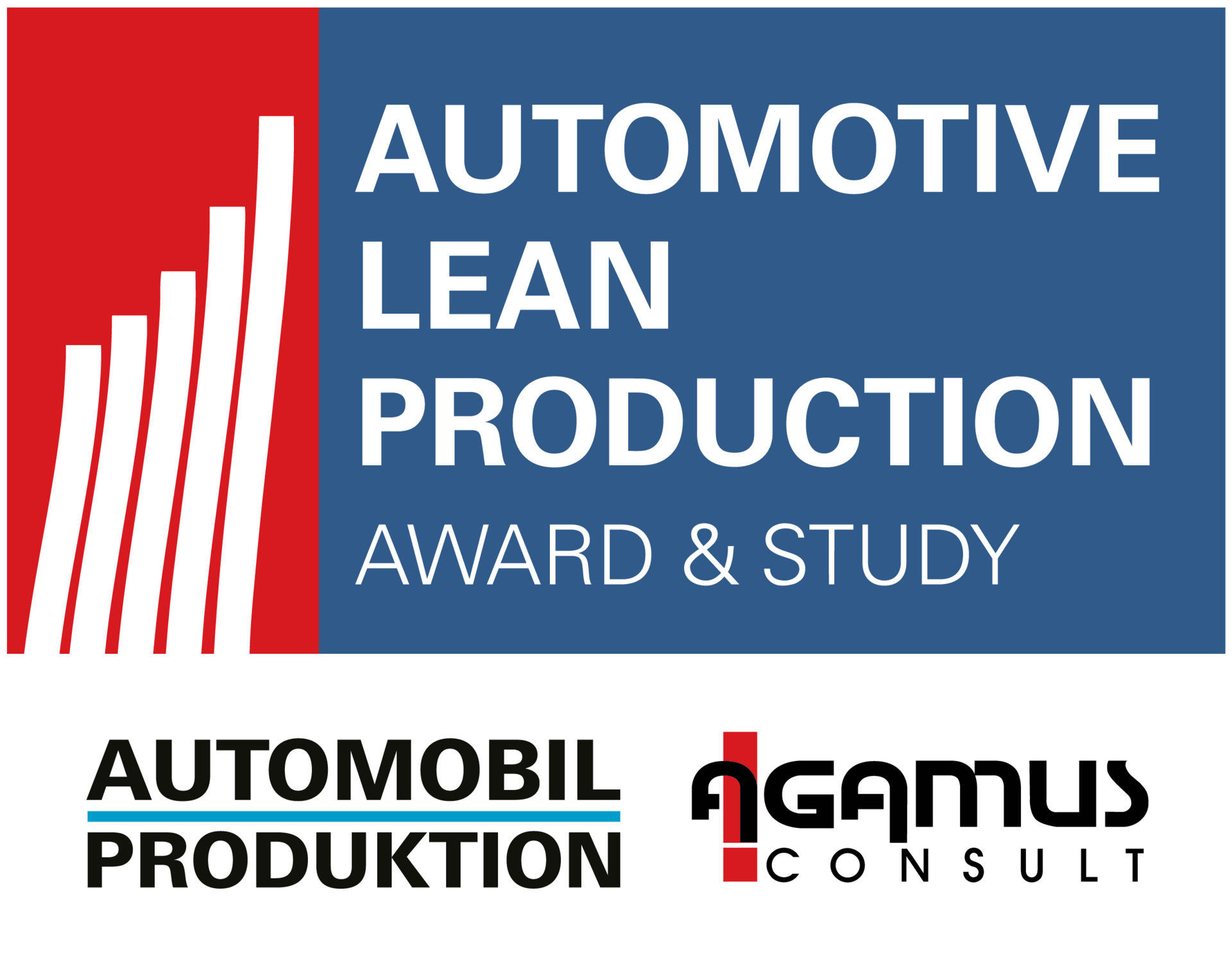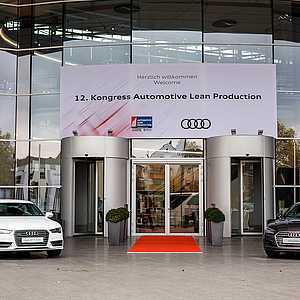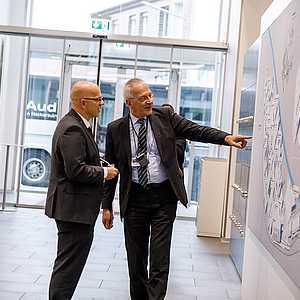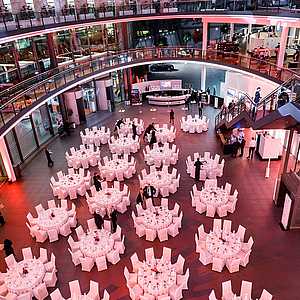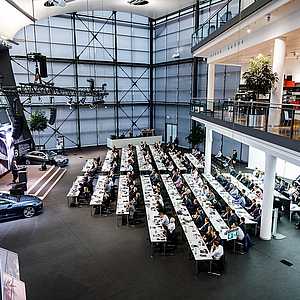The 12th Congress Automotive Lean Production took place on the 6th and 7th of November 2017 in Neckarsulm. For this purpose, The Audi plant kindly provided the Audi Forum for the event location and opened the doors to its plant for the guests of the congress.
The highlights of this year's factory tour focused on two topics. In the field of logistics, visitors saw clever ergonomic design examples as well as applications of I4.0, which make it easier for people to work and reduce the picking error rate. In the training center field, participants were able to convince themselves about how the empowerment of the people at the Audi plant stand in the foreground, whether it applies to the workers in situational professional rooms or to the executives in shop floor management with the concept of the mentor-mentee.
The winner speeches gave the participants first-hand information on how a factory with "passion for manufacturing", in a short time can turn into the "Lean World", as well as how a brownfield is not a handicap but a challenge that can be solved, so that "shaping the future with diversity and flexibility" becomes reality. Using Lean methods to stabilize processes first and then make them even safer and faster with I4.0 is the approach preferred by many winners. In contrast to lean, which is known for its clear target values, the term smart factory is not as clear.
In his key note "Smart Factory at Audi - from Vision to Reality", Mr. Stettner, Plant Manager Neckarsulm, impressed the audience by showing, how the Audi-Plan has been implemented step by step. The presentation Big Data @ Smart Factory outlined how far the thoughts can be stretched when it comes to the Smart Factory. The spectrum ranges from the descriptive analysis - "what has happened?" to the prescriptive analysis - "what should be done?". In the future, we expect to see much more in this area, however the participants of this year's Automotive Lean Production congress had an opportunity to get the first impression with concrete examples.
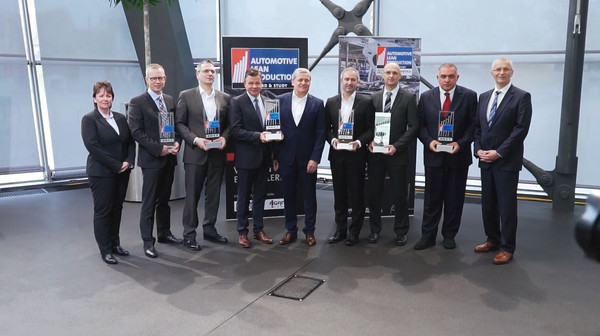
OEM: Daimler AG, Mercedes-Benz Bremen plant
As one of the highlights of the Mercedes production system, the jury states as an example the efficient material feed in car body manufacture in conjunction with low-cost automation, as well as the material preparation in the assembly area, using goods baskets as an important element of a so-called New Lean Concept. The assessors of Agamus also noticed in a positive way that additive manufacturing was used on site. As they explain, the idea to take a step further from production-suited towards function-oriented production arose under the motto "Future issues project". Using industrial as well as commercial 3D printers, equipment can be produced for everyday production in a flexible and cost-effective way.
Supplier: Magneti Marelli, Bari plant, Italy
The Italian supplier, Magneti Marelli, whose Bari plant has been awarded a Lean Production Award in the "Supplier" category, which is double awarded this time, belongs to the Fiat Chrysler Autombiles Group (FCA). In 2012, the Bari plant (manufacturing engine and gearbox components) started to implement a comprehensive lean approach where the rollout of the WCM production system (World Class Manufacturing System) used by FCA and meanwhile greatly refined played a gradual and successful role. According to the FCA, 60% of the Tier 2 suppliers should be WCM-qualified by 2020. In 2015, a first supplier was awarded the "WCM Bronze Level".
Cost deployment is realized at a new level of effectiveness and efficiency using the WCM Online Cost Compass developed in Bari. The quality work is exemplary – both the preventive quality work for new products and series and the reaction to one of the very rare errors. The Bari plant achieves "an excellent symbiosis of lean and digitalization". The stable processes due to the high degree of lean maturity allow to use smart applications to reach the next stage of waste prevention. During a personal practical test, the evaluation team was able to convince themselves of the useful use of VRT (Virtual Reality Training) or camera glasses.
Supplier: Continental AG, Timisoara plant, Romania
A further ALP Award in the Supplier category goes to the Romanian Timisoara. The Continental Automotive plant there, producing air bag controllers and vehicle instruments, was faced with the challenge of developing from a best-cost factory with a production program to be completed to a complete plant with high technical know-how. Within the framework of the CBS Continental Business System, the plant has set their own priorities in the form of the Timisoara Production Systems. The standard and visualization concepts, which are consistently applied, continually developed and partly also adopted by other Central Electronic Plant (CEP) locations of Continental are highlighted.
The many young local employees work hand in hand with the partly long-term management employees with a wealth of experience. Thanks to this combination, the good shop floor management and the vital idea of continuous improvement, the Timisoara plant has recently achieved outstanding gains in performance. Timisoara also plays a leading role in the CEP network when it comes to digitization. Pilot projects for Industry 4.0 are partly developed, tested and applied in close cooperation with other CEP locations or the central departments.
"Integrated Shop Floor Management" Special Award: Audi AG, Neckarsulm plant
The "Special Award" - for integrated shop floor management - was awarded to the last year's winner in the "OEM" category, the Audi plant in Neckarsulm. There, Shop Floor Management (SFM) is defined as "recognizing deviations and solving the problems directly on the spot as a daily management task". More specifically, Shop Floor Management is based on the elements of goal management, problem solving / continuous improvement, standards, communication, visualization and qualification. Since 2014, SFM has been a comprehensive project penetrating each corner of the plant and capturing each employee, driven by a top-down management approach. In terms of content, it is based on a six-stage plan.
Qualification of the employees begins with a basic skills training (safety, quality, ergonomics), continues with a fundamental understanding of Lean topics (why and how) and then, with a professional room training (manual basics for problem solving and model change) and, finally, ends at the workplace with perfection through standards. The whole is a living, self-controlling system: Recognition of process weaknesses from the SFM cascades, assignment to the training strategy, development of the training, implementation of the training with certified trainers and verification of sustainability. "The way in which shop floor management is part of the management and qualification culture at the Neckarsulm Audi plant, it is a powerful tool that delivers what it promises in a well-prepared environment: To become excellent in terms of lean and leadership," says Werner Geiger.
"Lean Transformation" Special Award: InTiCa Systems AG, Prachatice plant
Another special award, especially for "Lean Transformation", goes to a lean newcomer: The Czech plant at the Prachatice site of the InTiCa Group. With its product portfolio (control elements and safety systems for automobiles or inductive components and modules for industrial electronics), it has a lead function for the EU/NAFTA manufacturing alliance. Over the years, the technology factory has been continuously extended in large steps with great vertical integration:
In parallel to the ambitious growth, however, negative side-effects could also be noticed: The prevailing workshop production was accompanied by below-average value-adding activities of the employees, space problems in production and logistics as well as backorders in customer delivery. The plant was lacking lean tools, a lean production system and, finally, employees experienced in lean practices.
In this awareness, all processes were transformed from scratch. InTiCa focused on a controlled lean transformation with five implementation modules, the initial skills and resources of the organization being a very limiting factor that had to be overcome. First, the product portfolio was adjusted with internal core and key processes according to value flows. ABC-xyz analyses, product-process matrices and final analyses are important premises for deriving a future concept. Finally, the segmentation resulted in a combination of manufacturing lines for Highrunner and a flexible mixed-model production aimed at the further products. During production, more than 100 machines and equipment components were gradually moved into a flow-oriented overall layout. In line with the proven approach of "optimization from the inside to the outside", it was necessary to let the material "flow" and to significantly shorten the throughput times. A team-oriented organization was introduced and the structural and procedural organisation was adapted to the changed requirements with clearly defined roles and responsibilities.
"Smart Industrialization Of New Technologies" Special Award: BMW Group, CFK Production in Landshut
The CFK production of the Landshut BMW plant is recognised for their "smart industrialization of new technologies". The CFK volumes of the plant are also organizationally assigned to the Wackersdorf site. It is responsible for CFK structural components for the BMW M vehicles, the premium limousine BMW 7 series and the BMW i series. The Special Award recognizes the fact that a consistent lean philosophy was used to set up, in a short time, a modern production for technologically complex products such as the production of CFK components.
In order to ensure the competitiveness of this key technology for the future, it was necessary to generate the understanding for the processes. This was a basis for reducing the waste in the production processes. Agamus Managing Director Dr. Werner Geiger explains: "It has to be stressed that the production of the CFK components was still in the start-up mode. In addition to increasing the technical experience, material and production control have been consistently optimized. This led to a significant increase in stock quality and improved transparency of supplier performance. In order to reduce the throughput times continuously, workshops using the value stream methodology were held. Remarkable success could by achieved by the consistent involvement of the employees."
An additional adjustment screw for the optimization of the plant was installed by connecting the lean roadmap to the digitization roadmap of the department for purchasing and supplier network with defined use cases. There is a business case for every use case. The roadmap allows the testing of inter-divisional activities even at different degrees of maturity. Interdisciplinarity, clear structures and clear concentration on focus topics are the basis for successfully handling the opportunities of Industry 4.0. A result of the consistent implementation: The overall equipment efficiency (OEE) and the pertinent technical availability could be increased in large steps, and the delivery quality has improved significantly.
Congress organisation
phone +49 89 44 388 99 22
lean.award(at)agamus.com
